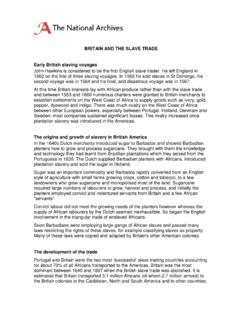Transcription of FOR WHOM THE BELL TOLLS - Mighty Networks
1 FOR whom THE bell TOLLS 4 In 1937 Ernest Hemingway traveled to Spain to cover the civil war there for the North American Newspaper Alliance. Three years later he completed the greatest novel to emerge from "the good fight," For whom the bell TOLLS . The story of Robert Jordan, a young American in the International Brigades attached to an antifascist guerilla unit in the mountains of Spain, it tells of loyalty and courage, love and defeat, and the tragic death of an ideal. In his portrayal of Jordan's love for the beautiful Maria and his superb account of El Sordo's last stand, in his brilliant travesty of La Pasionaria and his unwillingness to believe in blind faith, Hemingway surpasses his achievement in The Sun Also Rises and A Farewell to Arms to create a work at once rare and beautiful, strong and brutal, compassionate, moving, and wise.
2 "If the function of a writer is to reveal reality," Maxwell Perkins wrote Hemingway after reading the man uscript, "no one ever so completely performed it." Greater in power, broader in scope, and more intensely emotional than any of the author's previous works, it stands as one of the best war novels of all time. ERN EST HEM I N G WAY did more to change the style of English prose than any other writer in the twentieth century, and for his efforts he was awarded the Nobel Prize for Literature in 1954. Hemingway wrote in short, declarative sentences and was known for his tough, terse prose. Publication of The Sun Also Rises and A Farewell to Arms immediately established Ernest Hemingway as one of the greatest literary lights of the twentieth century. Part of the expatriate community of Paris in the 1920s, the former journalist and World War I ambulance driver began a career that led to international fame.
3 Hemingway was an aficionado of bullfighting and big-game hunting, and his main protagonists were always men and women of courage and conviction, who suffered unseen scars, both phys ical and mental. He died in 1961. mSCRIBNER PAPERBACK Published by Simon & Schuster New York I Cover design by Cheung Tai Cover illustration by Pamela Patrick FICTION 9 780684 803357 07951300 $ Can. $ ISBN 0-684-80335-6 .. -'" .. _'/ , _/ ,,""- .-/ --/ ' .. / .. _4' . ,,/ ./ "x / / / , /- / .x ' X -' x .. -- -Books by Ernest Hemingway THE COMPLETE SHORT STORIES THE GARDEN OF EDEN DATELINE: TORONTO THE DANGEROUS SUMMER SELECTED LETTERS THE ENDURING HEMINGWAY THE NICK ADAMS STORIES ISLANDS IN THE STREAM THE FIFTH COLUMN AND FOUR STORIES OF THE SPANISH CIVIL WAR BY-LINE: ERNEST HEMINGWAY A MOVEABLE FEAST THREE NOVELS THE SNOWS OF KILIMANJARO AND OTHER STORIES THE HEMINGWAY READER THE OLD MAN AND THE SEA ACROSS THE RIVER AND INTO THE TREES FOR whom THE bell TOLLS THE SHORT STORIES OF ERNEST HEMINGWAY TO HAVE AND HAVE NOT GREEN HILLS OF AFRICA WINNER TAKE NOTHING DEATH IN THE AFTERNOON IN OUR TIME A FAREWELL TO ARMS MEN WITHOUT WOMEN THE SUN ALSO RISES THE TORRENTS OF SPRING ERNEST HEMINGWAY FOR whom THE bell TOLLS SCRIBNER PAPERBACK FrCTIO),;" PUBLISHED BY SIMO),;" & SCHUSTER YEW YORK LO),;"DON TORONTO SYDNEY TOKYO SINGAPORE SCRIBNER PAPERBACK FICTION Simon & Schuster Inc.
4 Rockefeller Center 1230 Avenue of the Americas New York, NY 10020 This book is a work of fiction. Names, characters, places, and incidents either are products of the author's imagination or are used fictitiously. Any resemblance to actual events or locales or persons, living or dead, is entirely coincidental. Copyright 1940 by Ernest Hemingway Copyright renewed 1968 by Mary Hemingway All rights reserved, including the right of reproduction in whole or in part in any form. First Scribner Paperback Fiction Edition 1995 SCRIBNER PAPERBACK FICTION and design are trademarks of Jossey-Bass, Inc., used under license by Simon & Schuster, the publisher of this work. 9 10 This book is for MARTHA GELLHORN No man is an Iland, intire of it selfe; every man is a peece of the Continent, a part of the maine; if a Clod bee washed away by the Sea, Europe is the lesse, as well as if a Promontorie were, as well as if a Mannor of thy fr iends or of thine owne were; any mans death diminishes me, because I am involved in Mankinde; And therefore never send to know for whom the bell TOLLS ; It TOLLS for thee.
5 JOHN DONNE CHAPTER ONE HE LAY flat on the brown, pine-needled floor of the forest, his chin on his folded arms, and high overhead the wind blew in the tops of the pine trees. The mountainside sloped gently where he lay; but below it was steep and he could see the dark of the oiled road wind ing through the pass. There was a stream alongside the road and far down the pass he saw a mill beside the stream and the falling water of the dam, white in the summer sunlight. "Is that the mill?" he asked. "Yes," "I do not remember it." "It was built since you were here. The old mill is farther down; much below the pass." He spread the photostated military map out on the forest floor and looked at it carefully. The old man looked over his shoulder. He was a short and solid old man in a black peasant's smock and gray iron stiff trousers and he wore rope-soled shoes. He was breathing heavily from the climb and his hand rested on one of the two heavy packs they had been carrying.
6 "Then you cannot see the bridge from here." "No," the old man said. "This is the easy country of the pass where the stream flows gently. Below, where the road turns out of sight in the trees, it drops suddenly and there is a steep gorge-" "I remember." "Across this gorge is the bridge." "And where are their posts?" "There is a post at the mill that you see there." The young man, who was studying the country, took his glasses from the pocket of his faded, khaki flannel shirt, wiped the lenses with a handkerchief, screwed the eyepieces around until the boards of the mill showed suddenly clearly and he saw the wooden bench beside the door; the huge pile of sawdust that rose behind the open shed where the circular saw was, and a stretch of the flume that 2 Ernest Hemingway brought the logs down from the mountainside on the other bank of the stream. The stream showed clear and smooth-looking in the glasses and, below the curl of the falling water, the spray from the dam was blowing in the wind.
7 "There is no sentry." "There is smoke coming from the millhouse," the old man said. "There are also clothes hanging on a line." "I see them but I do not see any sentry." "Perhaps he is in the shade," the old man explained. "It is hot there now. He would be in the shadow at the end we do not see." "Probably. Where is the next post?" "Below the bridge. It is at the roadmender's hut at kilometer five from the top of the pass." "How many men are here?" He pointed at the mill. "Perhaps four and a corporal." "And below?" "More. I will find out." "And at the bridge?" "Always two. One at each end." "We will need a certain number of men," he said. "How many men can you get?" "I can bring as many men as you wish," the old man said. "There are many men now here in the hills." "How many?" "There are more than a hundred. But they are in small bands. How many men will you need?" "I will let you know when we have studied the bridge.
8 " "Do you wish to study it now?" "No. Now I wish to go to where we will hide this explosive until it is time. I would like to have it hidden in utmost security at a distance no greater than half an hour from the bridge, if that is possible." "That is simple," the old man said. "From where we are going, it will all be downhill to the bridge. But now we must climb a little in seriousness to get there. Are you hungry?" "Yes," the young man said. "But we will eat later. How are you called? I have forgotten." It was a bad sign to him that he had for gotten. FOR whom THE bell TOLLS 3 "Anselmo," the old man said. "I am called Anselmo and I come from Barco de Avila. Let me help you with that pack." The young man, who was tall and thin, with sun-streaked fair hair, and a wind-and sun-burned face, who wore the sun-faded flannel shirt, a pair of peasant's trousers and rope-soled shoes, leaned over, put his arm through one of the leather pack straps and swung the heavy pack up onto his shoulders.
9 He worked his arm through the other strap and settled the weight of the pack against his back. His shirt was still wet from where the pack had rested. "I have it up now," he said. "How do we go?" "We climb," Anselmo said. Bending under the weight of the packs, sweating, they climbed steadily in the pine forest that covered the mountainside. There was no trail that the young man could see, but they were working up and around the face of the mountain and now they crossed a small stream and the old man went steadily on ahead up the edge of the rocky stream bed. The climbing now was steeper and more difficult, until finally the stream seemed to drop down over the edge of a smooth granite ledge that rose above them and the old man waited at the foot of the ledge for the young man to come up to him. "How are you making it?" "All right," the young man said. He was sweating heavily and his thigh muscles were twitchy from the steepness of the climb.
10 "Wait here now for me. I go ahead to warn them. You do not want to be shot at carrying that stuff." "Not even in a joke," the young man said. "Is it far?" "It is very close. How do they call thee?" "Roberto," the young man answered. He had slipped the pack off and lowered it gently down between two boulders by the stream bed. "Wait here, then, Roberto, and I will return for you." "Good," the young man said. "But do you plan to go down this way to the bridge?" "No. When we go to the bridge it will be by another way. Shorter and easier." "I do not want this material to be stored too far from the bridge." "You will see. If you are not satisfied, we will take another place." "We will see," the young man said. 4 Ernest Hemingway He sat by the packs and watched the old man climb the ledge. It was not hard to climb and from the way he found hand-holds with out searching for them the young man could see that he had climbed it many times before.







